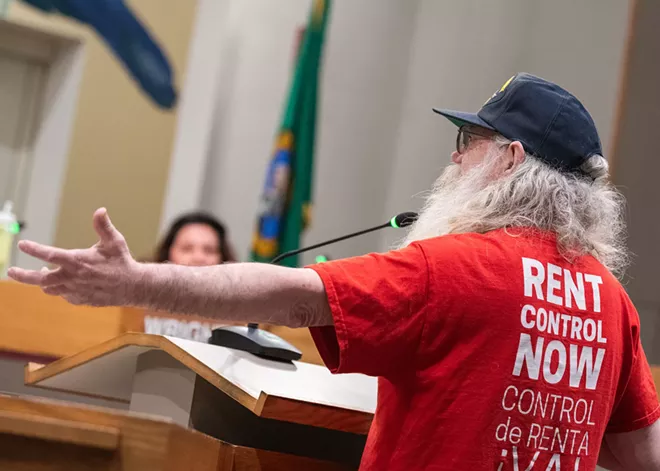
On Monday, the Spokane City Council passed a consequential — and hotly debated — city ordinance that aims to give tenants additional time to prepare for rent increases.
The law, which passed 5-2, requires landlords to give 180 days notice before rent increases of more than 3% and 120 days notice for increases under 3%. The rule applies to longer-term and month-to-month leases and takes effect June 1.
Washington state requires 60 days notice for rent increases. But City Council member Paul Dillon, who sponsored the new law, says that isn't nearly enough time for tenants to budget for rent increases and, if necessary, find a new place to live.
"We know the data on evictions in Spokane County, and we know they're corollary to rent increases," Dillon says. "If we are talking about ways to prevent homelessness, this is a way to do that, I firmly believe that."
Many landlords were strongly opposed to the new law — arguing that it will be too difficult to predict what inflation, property taxes and market conditions will look like six months in the future.
They also argued that a package of tenant protections that the council passed in February 2023 has already squeezed many small local landlords to the breaking point and forced some to sell their properties to corporations that raise rents.
"You have a good asset with the small mom-and-pop landlords that are left. Why drive the rest of them out of business?" Steve Wareham, a member of the Landlord Association of the Inland Northwest, told City Council members last week. "Some of them are on the verge of saying 'I just need one more reason to sell my properties and go.'"
Other landlords gave similar warnings. But claims about new regulations forcing small landlords to sell are hard to verify — partially because many landlords have yet to comply with a year-old requirement to register all of their rental units with a new city-run rental registry. As part of the registration process, landlords need to obtain an annual $127 business license (which was already required, but not enforced) and pay an annual $15-per-unit fee.
On the night of last year's rental reforms vote, City Council member Zack Zappone said the registry would help settle the debate over whether or not regulations actually prompt small landlords to sell.
"A lot of the fear that's around these ordinances will actually be clear once we have the registry in effect," Zappone said. "We'll be able to see if there's any movement on or off the market."
The deadline for landlords to register their properties was Jan. 1 this year.
But as of late April, it appears that less than half of all estimated rental units in Spokane have complied.
Mayor Lisa Brown says she's directed her team to update her on what needs to happen to ensure people comply with the registry law. The recent debate over Dillon's six-month notice law underscores why the registry is important, she says.
"There are a lot of anecdotes, I'm sure some of them are true," Brown says. "But I also think that we lack bigger picture information that would be helpful for us to make good policy."
'PEOPLE ARE CONFUSED'
Nobody knows exactly how many rental units exist in Spokane — that's partly why the registry was created in the first place. But in 2023, the Census Bureau estimated that there were 102,102 housing units in the city of Spokane, 57% of which were owner-occupied. That leaves about 43,900 possible rental units in the city.
Steve Corker, the president of the Landlord Association of the Inland Northwest, says he partnered with Avista and the city on a study four years ago that estimated there were 42,000 rental units.
So far, property owners and managers have registered 18,151 units with the city.
Corker thinks many landlords haven't yet registered because they don't know how or aren't even aware it's required.
"People are confused about how to do it," Corker says. "Our membership meetings usually have about 90 people out of our 800 members, and most of the older ones don't have online accessibility. ... Just educating our membership has been a challenge."
Rollout of the online registry in December was also complicated by minor technical problems. But in a Jan. 2 blog post, the city's Code Enforcement department said the bugs had been addressed, and encouraged people who missed the deadline to register as soon as possible.
The department also warned that landlords who don't comply with the registration requirement by "early 2024" could be issued a Class 1 civil infraction, which comes with a $261 fee.
But no infractions have been issued so far, says Brian Walker, a spokesperson for the city.
"This is a new program with an intent of getting contact information from all owners of rental property. Without the registry, we would not have the ability to contact the owners on the registration requirement," Walker says. "Because of this, we are being lenient this first year."
Walker says people who haven't registered their rental properties yet should do so by going to the code enforcement page on the city's website.
"While we are happy with the registration to this point, we are now working at identifying remaining rentals and notifying the owners or managers," Walker says.
UP TO CODE
In addition to counting the exact number of units, the registry was also created to help the city be more proactive about regularly inspecting rentals for subpar living conditions — regardless of whether or not a tenant has recently made a complaint.
Terri Anderson, the director of the Spokane office of the Tenants Union of Washington State, says she's had several tenants call her because they're concerned about the fact that their units aren't on the registry. (Tenants can check if their rental is registered by searching aca.spokanepermits.org.)
"We are a city full of rental homes that are not in good condition, but there's no way the city can get a handle on it until they have a rental registry," Anderson says.
The money from the business license and registration fee is intended to be used for inspection-related expenses and three new code enforcement staff dedicated to rental inspections. Walker, with the city, says Code Enforcement will be filling those positions this year.
Corker says the Landlord Association was never opposed to the idea of a rental registry itself — just the fact that the City Council attached fees to its registry.
"They're asking the landlords and the tenants to basically pay for the system," Corker says.
Anderson thinks it's a small price to pay. The evictions ordered by landlords can lead to homelessness and put significant financial strain on the city, she says.
"It seems to me that $15 is a pretty good deal for them," Anderson says.
The registry law says "landlords may charge tenants the actual cost of the business registration fee." During a meeting earlier this month, Code Enforcement Director Luis Garcia told council members that the $15 registration fee is a cost that's "assumed to be passed on" to the tenant. Landlords that offer below-market rent can also get the $15 fee waived.
If there are indeed 26,289 unregistered units in Spokane, that means the inspection fund is still waiting on nearly $400,000 in uncollected fees from the $15 registry charge. The amount of uncollected money from the $127 business license fees could add even more to the fund.
FALLING SKIES
Dillon says the lack of compliance with the rental registry program is part of why he wanted to "add some teeth" to the new rent increase notice requirements that passed Monday.
The law has a "private right to action" clause, which means tenants who believe their landlord violated the notice period can sue in Superior Court. If they win, tenants have the right to terminate their lease, and the ability to recoup legal costs.
Dillon says the new law was inspired by state House Bill 2114, a sweeping rent stabilization bill that failed to pass this year.
In addition to increasing the notice period to 180 days statewide for rent increases of more than 3%, the HB 2114 would have prohibited landlords from raising tenants' rent by more than 7% per year and restricted late fees to no more than 1.5% of monthly rent.
Dillon, who testified in favor of the bill, thinks it would have had a better shot if it was only focused on the 180-day notice period.
"Everyone was very focused on the rent stabilization component, and that's why the bill died," Dillon says. "It didn't die because of the notification period."
State law prohibits cities from passing rent control laws, but cities are allowed to increase the required notice period. Ten Washington cities, including Seattle and Tacoma, have passed laws that go beyond the 60-day statewide requirement.
"We're not the first city to do this," Dillon says. "The sky is not going to fall."
Last week, Liz Vandenberg, the executive director of Spokane's Building Owners and Managers Association, told City Council members that the law will decrease the supply of housing units.
"Not all small mom-and-pop landlords know the process, they don't know how to engage, they don't know the rules," Vandenberg said. "And when we continue to do really tough legislation like this, that's really confusing and tough to understand, that's when you start losing these units."
Anderson says she hasn't seen any evidence to support the idea that regulations force small landlords to sell.
"I've heard that for the entire 10 years I've been at the Tenants Union," Anderson says. "We know landlords are also real estate investors, so they sell their property when the price is right."
On Monday, dozens of landlords and tenants packed the City Council chamber to speak for and against Dillon's proposed notice law.
Lisa Biggs described receiving a 42% rent increase notice in February this year. She said she sat down on the couch and cried after opening the letter.
Sixty days wasn't enough time to find a new place, she said. Vacancy rates are low. Paperwork, applications, packing and moving all take time. Moving fees, security deposits, and first and last month rent are too expensive.
"I'm 65 years old. I'm single. I live alone on Social Security. Now I can add rent burden as a descriptor," Gibbs said.
Gibbs told council members that she's looking for ways to reduce expenses — perhaps by cutting back on insulin or by taking blood pressure medication every other day instead of daily.
"Maybe I won't be buying my grandkids birthday presents anymore," Gibbs said.
Many tenants shared similar stories of life-changing rent increases. Landlords expressed sympathy but argued that Dillon's proposed law would unintentionally make the problem worse. One landlord told tenants in the audience that they should simply talk to their landlord and ask for leniency if they're worried about being priced out.
The ordinance eventually passed, with Council members Michael Cathcart and Jonathan Bingle in opposition. They argued that the six-month period could result in landlords budgeting rent increases with the worst-case scenario in mind, and unintentionally harm tenants.
Council President Betsy Wilkerson promised to keep an eye on the rental supply and prices and to reevaluate the law if it doesn't seem to be working.
"We can get data in a year or two," Wilkerson said. "[If] you come back with data that says this is not working... I think I'll still be around then. I will entertain the idea of sponsoring that ordinance to review this and roll it back." ♦






















